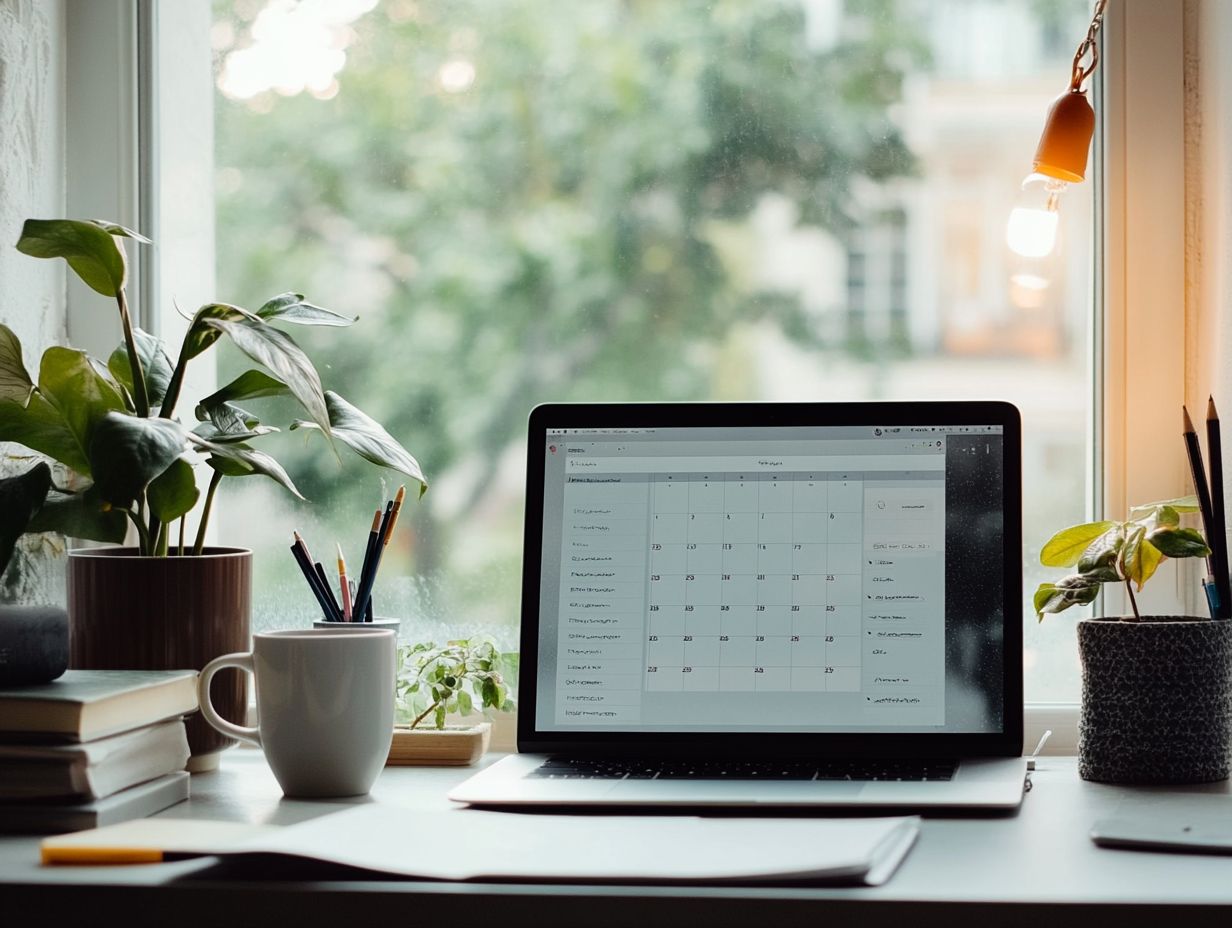Time management plays a vital role in achieving productivity and maintaining a balanced life. The time-saving tips in this article will delve into the common factors that tend to waste your time and offer effective strategies for reclaiming those lost hours. Lots of ways to help you save time!
We will cover various techniques for prioritization and scheduling, as well as the use of productivity tools that can help streamline your workflow. You will gain insights on how to set boundaries, delegate tasks effectively, and adapt your approach to different work environments.
By discovering the principles of smart time management, you can transform your workday for the better!
Why is Time Management Important?

Time management plays a vital role in achieving personal productivity and maximizing efficiency in both professional and personal areas of life. It enables individuals to allocate their hours effectively, maintain a balance between work and personal commitments, and meet deadlines without the pressure of last-minute scrambles.
By recognizing the significance of time management, one can improve organizational skills and performance metrics, ultimately resulting in better outcomes and a greater sense of satisfaction in daily tasks.
Identifying Time Wasters
Identifying time wasters is crucial for enhancing personal productivity and achieving greater efficiency in your daily routine. Common offenders often include procrastination, distractions, and ineffective multitasking, which can easily derail your focus and result in missed deadlines.
By monitoring your time and examining your workload, you can identify these time wasters and streamline your processes with time-saving hacks, ultimately improving your overall productivity.
Common Time-Wasting Activities
Common time-wasting activities can significantly hinder efficiency and productivity if not addressed. These distractions often include activities such as browsing social media, attending ineffective meetings without clear agendas, and managing emails too frequently. Recognizing these activities is the first step toward minimizing their impact and enhancing overall time management.
In today s fast-paced work environment, many individuals find themselves caught in the trap of multitasking, which can lead to a decrease in focus on critical tasks. For example, constantly checking emails while trying to engage in a meeting can result in important details being overlooked, ultimately affecting project outcomes. Unproductive meetings, characterized by vague objectives and minimal participation from attendees, can drain valuable time that could be better spent on actual work.
By being aware of these distractions and addressing them proactively, individuals can cultivate a more focused and effective approach to managing their responsibilities.
Time-Saving Tips for Effective Time Management
Implementing effective time management strategies can significantly enhance productivity and reduce stress levels. Techniques like time-blocking, task prioritization, and automation are excellent ways to streamline workflows and make the most of your available time.
Furthermore, developing strong delegation skills enables you to distribute your workload more efficiently, fostering a more organized approach to daily responsibilities.
Prioritization Techniques
Utilizing prioritization techniques, such as the prioritization matrix, can significantly enhance your ability to manage tasks effectively. By assessing tasks based on their urgency and importance, you can concentrate on setting goals that align with your sense of purpose. This method not only boosts productivity but also alleviates the cognitive burden that often comes with decision-making.
Incorporating these techniques into your daily routine gives the power to you to systematically identify what truly matters. The prioritization matrix, for example, provides a visual representation of tasks, making it much easier to determine which ones should be addressed first. Adopting a clear goal-setting framework helps streamline your efforts, ensuring that the activities you undertake are not just completed but also contribute meaningfully to your larger objectives.
By applying these strategies consistently, you can cultivate a proactive mindset, leading to improved mental clarity and greater resilience against distractions that frequently disrupt focus.
Creating a Schedule and Sticking to It
Creating a well-structured schedule and adhering to it is essential for maximizing productivity and ensuring effective time management. By employing techniques such as time-blocking and establishing a consistent routine, individuals can create accountability for their tasks and reduce stress levels. Sticking to your schedule not only enhances focus but also improves overall efficiency.
To begin, it is important to identify your most productive hours and allocate specific blocks of time for tasks or projects that align with your energy levels. Next, prioritize your daily responsibilities by categorizing them into urgent and important tasks, ensuring that high-impact activities are addressed first. Regularly reviewing and adjusting your schedule can further enhance your time management effectiveness, allowing for necessary flexibility.
Incorporating breaks into your time blocks is equally crucial, as these pauses help to recharge your mind and facilitate creativity. A well-maintained schedule fosters a positive work environment, leading to higher output and a reduction in feelings of overwhelm.
Tools and Apps for Time Management
Using the right tools and applications for time management can greatly improve productivity and optimize your workflow. Productivity apps and digital tools provide features for time tracking, task management, and seamless technology integration. This allows individuals to streamline processes and enhance daily organization.
By choosing the most suitable tools, one can maintain focus and effectively manage their workload.
Productivity Apps and Software
Productivity apps and software play an essential role in improving task management and time tracking for both individuals and teams. Many of these workplace tools facilitate better collaboration, digital organization, and effective project management, ensuring that everyone remains aligned and focused on their objectives. Selecting the appropriate app can significantly enhance workflow and accountability.
There is a vast selection of options available, ranging from simple to-do list applications to comprehensive project management software, each designed with unique features to address various needs. For example, time-tracking tools allow users to monitor the hours spent on tasks, which enhances accountability and helps teams identify areas where efficiency can be improved.
Digital organization features, such as document sharing and integrated calendars, streamline communication and elevate overall productivity. By utilizing these tools, teams can effectively prioritize tasks, consider deadlines, and adopt a more structured approach to collaboration. This ultimately leads to improved outcomes and greater satisfaction in the workplace. I have used DropBox for file sharing and Fantastical for my calendar for as long as I can remember and swear by them.
Setting Boundaries and Saying No
Establishing boundaries and mastering the art of saying no are crucial for achieving a healthy work-life balance and improving personal productivity. By steering clear of overcommitting to tasks and responsibilities, individuals can develop self-discipline and safeguard their focus strategies.
This proactive approach not only encourages accountability but also guarantees that there is sufficient energy and time available for one’s priorities.
How to Avoid Overcommitting
To avoid the pitfalls of overcommitting, it is essential to cultivate self-discipline and maintain a clear understanding of your priorities and commitments. By sharpening your decision-making skills, you can effectively evaluate incoming tasks and responsibilities, which ultimately reduces stress and fosters personal growth. Setting boundaries on what you can manage at any given moment is critical for sustaining productivity and maintaining focus.
This involves taking the time to assess your capacity and recognizing when it is appropriate to decline additional obligations. Engaging in regular self-reflection can provide valuable insights into your personal goals and help clarify the most important commitments you should focus on.
Implementing techniques such as designating specific time blocks for tasks, utilizing planners to visualize your schedule, and prioritizing essential responsibilities can significantly assist in managing your commitments.
Ultimately, adopting a mindful approach not only alleviates feelings of overwhelm but also encourages a more meaningful and fulfilling life experience, promoting not just efficiency but overall well-being.
Time-Saving Tips for Delegating Tasks and Outsourcing
Delegating tasks and outsourcing responsibilities are essential strategies for improving productivity and ensuring that resources are used efficiently. By mastering the art of delegation, you can effectively distribute workloads among team members, which fosters collaboration and enhances overall outcomes.
Recognizing the right moments to hand off tasks allows you to concentrate on high-priority responsibilities, ultimately optimizing your time management and enhancing work efficiency.
Effective Delegation Techniques for Productivity
Implementing effective delegation techniques is essential for enhancing performance within a team. By fostering a sense of accountability and encouraging strategic thinking, you can ensure that tasks are carried out efficiently and align with project management objectives. When responsibilities are delegated appropriately, you free up valuable time to focus on higher-level planning, goal setting, and decision-making.
To achieve this, it is helpful to clarify objectives, as this allows team members to understand the broader context and their specific roles within it. Providing the right resources and support enables individuals to confidently take ownership of their tasks. Regular check-ins, performance metrics evaluations, and constructive feedback are crucial in promoting a culture of accountability, allowing team members to reflect on their progress and make necessary adjustments.
Engaging individuals in discussions about project management strategies not only enhances their strategic thinking skills but also promotes a sense of collaboration, ensuring that everyone is aligned and working toward common goals. This collaboration can be further supported by using collaboration tools and facilitating effective communication.
Time-Saving Tips in Specific Work Environments for Better Work-Life Balance
Saving time in various work environments be it in an office, working remotely, or freelancing calls for specific strategies designed to enhance productivity. By applying time-saving tips that are relevant to your particular setting, you can address common challenges and foster a workplace culture that encourages efficiency and focus. These strategies can include time blocking, calendar management, and using efficiency tools.
Each environment offers distinct opportunities to optimize workflows and manage tasks effectively. For instance, implementing workflow optimization techniques can significantly improve task management and overall productivity.
Office, Remote, and Freelance Work: Adapting to Enhance Productivity
Office, remote, and freelance work arrangements each present unique challenges and opportunities for optimizing productivity. By utilizing the right workplace tools and fostering digital organization, communication and collaboration among team members can be significantly enhanced. Adapting your routine to suit your work environment is essential for ensuring that your time management strategies are both effective and impactful. Techniques like time tracking and work automation are particularly beneficial.
In an office setting, traditional tools such as project management software, in-person meetings, and feedback loops facilitate real-time discussions, providing immediate feedback and opportunities for brainstorming. On the other hand, those who work remotely often rely on cloud-based applications and virtual communication platforms. These tools help bridge the distance between team members, enabling seamless collaboration despite physical separation.
For freelancers, maintaining a structured routine is often crucial. Utilizing time-tracking tools and establishing clear boundaries can help minimize distractions and enhance focus. Prioritizing tasks and practicing self-discipline are also key. By recognizing the distinct dynamics of each work arrangement, individuals can tailor their approach to maximize efficiency while fostering effective communication across various channels. Incorporating time-saving tricks to boost your productivity can further enhance your effectiveness.
Frequently Asked Questions on Productivity
How to Save Time at Work for Better Job Satisfaction?
1. One way to save time at work is by prioritizing your tasks. Identify what needs to be done first and focus on those tasks before moving on to less important ones. Utilizing to-do lists can help in this process.
2. Another tip is to minimize distractions. This can include turning off your phone notifications or closing unnecessary tabs on your computer to help you stay focused on your work. Practicing mindfulness can also aid in maintaining focus.
3. Utilizing tools and technology can also help save time at work. This can include project management software, time tracking apps, or automation tools. Regular time audits can help in identifying areas for improvement. For more strategies, check out these tips and tricks to get more work done.
How Can Proper Time Management Help Me Save Time at Work for Better Work-Life Balance?
1. By effectively managing your time, you can create a schedule that allows you to complete tasks efficiently and avoid wasting time on unimportant or low-priority tasks. Techniques like time blocking can be very effective.
2. Time management also helps you identify areas where you may be spending too much time and find ways to streamline those tasks, ultimately saving you time in the long run. Conducting regular time audits can be beneficial.
3. Proper time management also allows you to plan for unexpected tasks or interruptions, leaving you more time to focus on your important work. This can significantly enhance your work efficiency and job satisfaction.
How Can Task Delegation Save Me Time at Work?
1. Task delegation to others can help free up your time to focus on more important or time-sensitive tasks.
2. It also allows you to leverage the skills and strengths of your team, resulting in more efficient and effective completion of tasks. Utilizing delegation strategies can enhance this process.
3. Delegating tasks can also help you avoid burnout and prevent you from spreading yourself too thin, which can ultimately save you time and increase your productivity. To further enhance your efficiency, consider strategies that allow you to maximize your productivity with these time-saving techniques. This practice is crucial for maintaining a healthy work-life balance.
How Can Taking Mental Breaks Help Me Save Time at Work?
1. Taking short breaks throughout the day can help prevent burnout and keep your mind fresh, ultimately improving your focus and productivity. Incorporating mental breaks into your daily routine can be quite beneficial.
2. Breaks also allow you to step away from your work and come back with a fresh perspective, potentially helping you find more efficient ways to complete tasks. This practice contributes to better time estimation and decision-making.
3. By taking care of your physical and mental well-being through breaks, you can avoid getting sick or feeling overwhelmed, both of which can negatively impact your ability to work efficiently. This practice is key for effective stress management.
How Can I Effectively Manage My Email to Save Time at Work and Improve My Personal Productivity?
1. Set a specific time of day to check and respond to emails, rather than constantly checking throughout the day. This allows you to focus on your tasks without interruptions. Effective calendar management can assist with this.
2. Utilize filters and folders to automatically organize your emails and prioritize which ones need your immediate attention. Employing digital tools for email organization can streamline this process.
3. Unsubscribe from unnecessary email lists or newsletters to reduce the clutter in your inbox and save time sorting through them. This practice helps maintain a cleaner and more efficient work environment.
How Can Planning My Day in Advance Save Me Time at Work?
1. Take a few minutes at the end of each day to plan out your tasks for the next day. This allows you to hit the ground running and start working on your priorities immediately in the morning. Using to-do lists for this can be very effective.
2. Planning in advance also allows you to allocate your time more effectively, ensuring that you have enough time for each task and avoid rushing or missing deadlines. Techniques like time blocking and scheduling can be very helpful.
3. By having a plan in place, you can also reduce decision-making time and stay focused on your tasks, ultimately saving you time and increasing your productivity. This approach also aids in better energy management.









